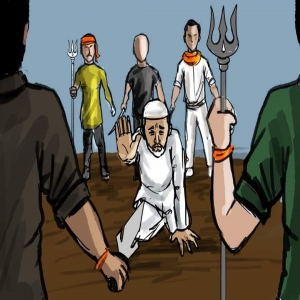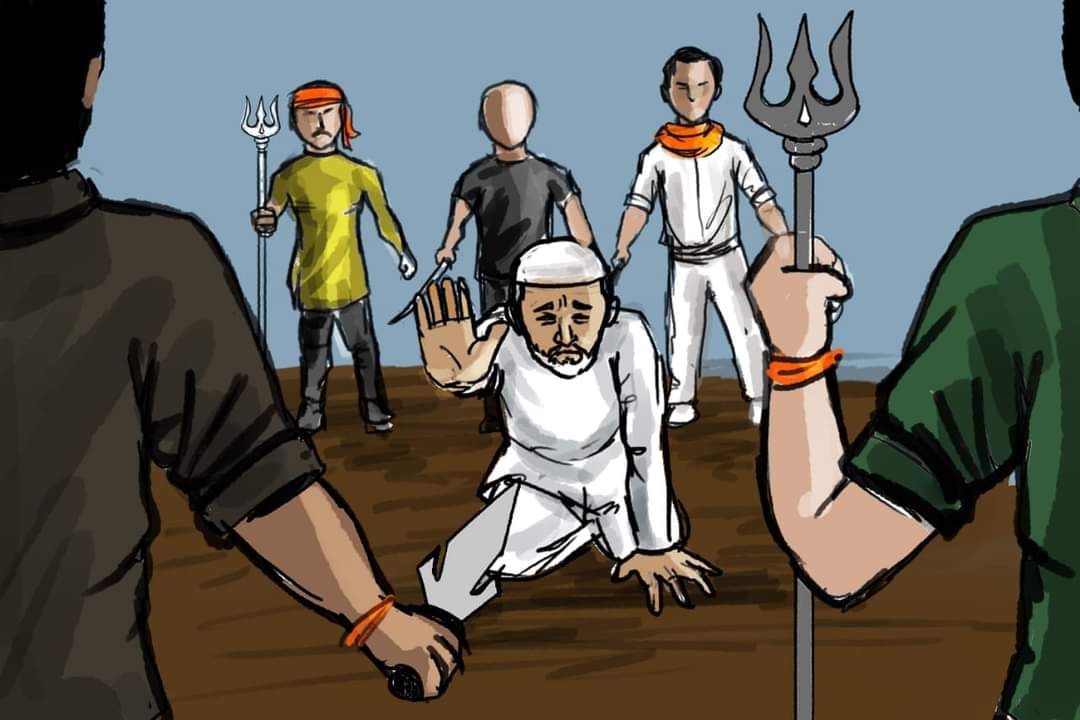
.jpg) Aakash
Aakash

Vigilantism is often romanticised as a form of direct justice in the movies. While the idea of taking the law into one's own hands can seem appealing, the practice, however, never ends well, as is evident from the murder of a 19-year-old after a close to 40-kilometre car chase in Haryana. Aryan Mishra from Haryana's Palwal district was shot dead after vigilantes, led by Anil Kaushik, who runs a cow vigilante group, mistook them for cow smugglers and chased their Renault Duster. The police claim to have apprehended all the culprits. This case shows explicitly why vigilantes must be done away with. Mishra was killed in cold blood. But it is not that alone that is a cause for outrage. It is the fact that Mishra was Hindu, killed by another Hindu – who thought he was Muslim.
The most significant drawback of vigilantism is its direct challenge to the rule of law. In any functioning society, the rule of law ensures that justice is delivered through established, impartial, and transparent legal processes. Vigilantism, on the other hand, is extrajudicial by nature—it bypasses these legal channels, often based on the assumption that the legal system is inadequate. This sets a dangerous precedent where individuals feel entitled to determine guilt and administer punishment at their discretion.
As is the case with the recent lynching cases, innocent people can be wrongly targeted just based on rumours, personal vendettas, or mistaken identities. Without the safeguards of the legal systems, such as the presumption of innocence and the right to a fair trial, vigilantism can quickly devolve into mob justice, where the loudest voices or the strongest forces dictate the outcome.
Yet another major con of vigilantism is its tendency to escalate violence. When individuals or groups take justice into their own hands, they often resort to methods far more brutal than those employed by state authorities. This perpetuates a culture of violence where disputes are increasingly settled through force rather than dialogue. While vigilantism may initially seem to focus on certain situations, it makes communities more dangerous and unstable over time.
Add to that deadly cocktail a mix of uneducated, uncultured and politically motivated bovine business, and you get cow vigilantism. Its very notion is built upon targeting minorities. Cow vigilantism disproportionately targets minority communities, especially Muslims and Dalits, who are often involved in the cattle trade or consumption of beef. The perceived protection of cows becomes a pretext for persecuting these communities, leading to an increase in communal violence and a growing sense of alienation among minorities.
Cattle rearing and trading are critical sources of livelihood for many, particularly in rural areas. Such vigilantism disrupts these economic activities, leading to financial hardships for individuals and families. There is a constant and growing fear of being attacked or accused of cow slaughter.
This incident happened in Haryana, where the frequency of attacks on minorities has shot up exponentially. Last month, the state was shaken by the mob lynching of Sabir Malik, a migrant labourer from West Bengal. Malik was seized on suspicion of consuming cow meat. He and his friend Asserudin were lured to a scrap shop in the area, where they were brutally attacked. Although Asserudin managed to escape, Malik was captured, taken away on a two-wheeler, tortured further, and ultimately killed. While five individuals involved in cow vigilantism were arrested, the apprehension of two minors in connection with the crime added to the shock.
One of the most concerning aspects of cow vigilantism is the implicit endorsement it receives from political leaders, particularly in BJP-ruled states. The statements and actions of some ministers have been seen as emboldening these vigilantes. By making public remarks that emphasise the protection of cows as a priority without condemning the violence perpetrated by these groups, these leaders create an environment where vigilante actions are legitimised.
Haryana Chief Minister Nayab Singh Saini tried to downplay the killing of Malik, arguing that it could not be termed "mob lynching." "It is not right to say things like mob lynching because a strict law has been made in the Assembly for cow protection, and there is no compromise on it," said Saini. He added, "Villagers have so much respect for cows that if they are informed about such things, then who can stop them? I want to say that such incidents should not happen, and these incidents are unfortunate."
Such statements praise murderers and reiterate the importance of cow protection but fail to address the violence associated with these groups. This selective condemnation sends a message that the government is more concerned with protecting cows than with upholding the law and protecting human lives.
The silence of the Prime Minister and the central BJP government on the issue is also profoundly unsettling. Despite numerous incidents of mob lynching and violence in the name of cow protection, there has been little to no strong condemnation from the highest levels of government. However, that is to be expected as it is tacitly approved by the RSS-BJP.
The role of the police in handling cow vigilantism is another critical issue. In many instances, police in BJP-ruled states have been accused of either being complicit with the vigilantes or of turning a blind eye to their activities. The police apologised in a case in Hapur where visuals emerged of a Muslim man being dragged by the mob who were supported and safeguarded by the police. In most cases, the police involvement never comes to light. There have been reports of police officers delaying intervention during mob attacks, failing to arrest perpetrators promptly, or even filing cases against the victims instead of the attackers. When the police, who are supposed to uphold the law, allow vigilantes to operate with impunity, it is a sign that law and order are in shambles.
The state has a high incidence of crimes against women, including assault, domestic violence, and honour killings. Despite these alarming statistics, the protection and empowerment of women remain secondary concerns compared to the fervent efforts to safeguard cows. While cow vigilantes are quick to mobilise in response to any perceived threat to cows, similar urgency is rarely seen when it comes to addressing crimes against women. Victims of assault and their families frequently encounter delays in filing reports, inadequate investigations, and a justice system that seems indifferent to their plight.
The disparity in the treatment of cows and women also reflects the priorities of both the central and state governments. Policies and initiatives aimed at cow protection are often well-funded and widely publicised, while programs for women's welfare and empowerment struggle to gain traction. This situation sadly persists not only in Haryana but across the country.